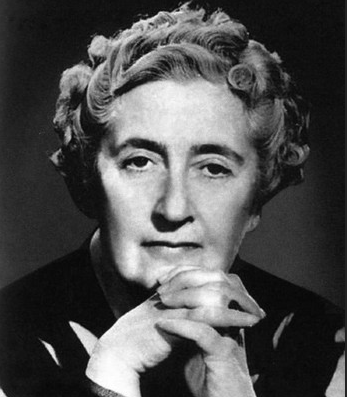by Lisa Shapter
When people think of the clever things mystery writer Agatha Christie does with narrative they usually mention The Murder of Roger Ackroyd (1926). I’ve been reading her later Hercule Poirot mysteries in order and I’ve discovered she seamlessly pulls off a more subtle effect: writing without comment or fanfare from male perspectives (with sympathetic concern in Dumb Witness (1937) for the issues of domestic violence, elder abuse, and restrictive divorce laws). She also breaks other ‘rules’ about narration and perspective (including her frequent, charming-when-it-ought-to be-irritating habit of having characters remark ‘Why, that only happens in mystery novels!’)
In 2016 I read the three(!) Poirot mysteries Christie published nearly 80 years ago, in 1936: The ABC Murders (The Alphabet Murders), Murder in Mesopotamia, and Cards on the Table.
Christie does something startling in The ABC Murders: she alternates the conventional 3rd person narration of Poirot’s friend-and-Watson-figure, Captain Hastings, with chapters of 1st person narrative from the primary suspect on the eve of each killing. (These chapters are actually reconstructions by Hastings who must have more of an imagination than Poirot gives him credit for.) This seems jarring and awkward at first (why not simply have the suspect hand over a later-excerpted diary when Poirot interviews him in jail late in the book?) But it turns out to be necessary in this unusual mystery where those closest to each victim assist Poirot on the case.
Murder in Mesopotamia starts with an unusual frame story from a tertiary character, a man, describing the woman who will be a central part of the case. It seems like an awkward entry point for an appealing, isolated-setting ‘county house’ mystery with a wonderfully realized location (a 1930s archaeological dig written by the wife of an actual 1930s archaeologist) but the frame gives a necessary outside viewpoint on the narrator that the woman herself could not give.
Cards on the Table has Poirot accepting the help of several other detectives, as equals, and admitting to his own faults of being overbearing and willing to do questionable things (trespassing on active crime scenes, eavesdropping, lying, and fabricating evidence) in order to solve cases. This breaks with Christie’s consistent earlier portrayals of her detective as admirable but mildly eccentric: in the late 1930's her writing starts to suggest that her detective’s neatness, his scrupulousness, and his sense of moral imperative might have a shadow side.
I put off reading Agatha Christie because I expected her work would be conventional and old-fashioned; I had read my share of once-groundbreaking science fiction half the Poirot series’s age that now seemed like well-done but staid set pieces. Instead I’ve found her mysteries to be masterful and startling. It is easy to think a man like the fictional Captain Hastings wrote them: honorable, conventional, blinkered by era and education; but Agatha Christie was a widely-read (and-traveled) woman with an excellent but unconventional education, making the illusions and limitations within her fictional viewpoints all the more surprising. Her 80-year old works have been a great pleasure to read in 2016.
Lisa Shapter is an alumna of the Bread Loaf Young Writers’ Conference and a member of Codex Writers’ Group. She lives in New England, collects antique typewriters, and is researching a history of 20th century women SF authors. She is a member of Broad Universe and the Dramatists’ Guild of America. Her science fiction play “The Other Two Men,” featuring characters from her short stories, was performed at the Players’ Ring of Portsmouth, New Hampshire in the summer of 2016. Her short stories have appeared in Black Denim Lit, Expanded Horizons, Four Star Stories, Kaleidotrope, and in the anthology Things We Are Not: An M-Brane SF Magazine Queer Science Fiction Anthology. Her novella A Day in Deep Freeze was published in 2015 in Aqueduct Press’s Conversation Pieces series.


No comments:
Post a Comment